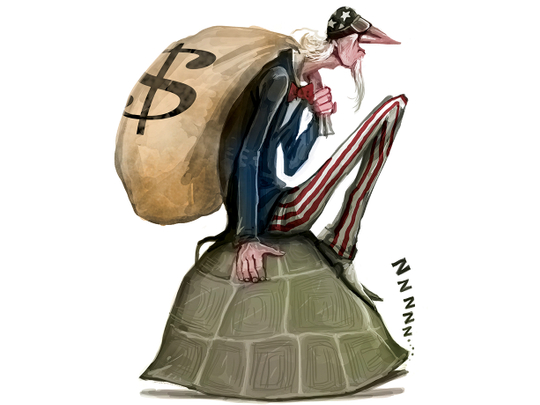
The outcome of the US election likely contributes to continued equity market volatility, in our view. President-elect Donald Trump’s campaign clearly struck a nerve with many Americans, reflecting what some might characterise as a disenfranchisement with the current state of the US government.
His appeal as an outsider, a person who could bring a different voice to Washington, implies change, and with change comes uncertainty. The previously maintained balance of power between the executive and legislative branches now rests with the Republican Party. This may result in more significant policy shifts over the coming years.
Though US equity markets have demonstrated resiliency since the global financial crisis, political challenges in the US and abroad have contributed to bouts of market volatility, and we believe this event will likely have the same effect. During the past eight years, we’ve found that the underlying strength of the US economy supported by positive corporate and consumer fundamentals has been a key driver for value creation.
We believe the health of the economy, in concert with corporate earnings and dividend growth and consumer employment and spending trends, should be a significant factor for future market returns. However, it’s important to recognise that Trump’s trade agenda could alter the path to growth for multinationals, casting doubt into many investors’ minds about the sustainability of market resiliency.
What remains to be seen is where the new administration will focus their efforts and how the policies will take shape. Our role as active managers is to discern where these potential impacts might create risks and opportunities for our clients.
Leading up to the election, our teams had been evaluating the potential policy implications of both candidates to inform our views about where different sectors of the market may be impacted. Sectors potentially facing regulatory changes or systematic government policy changes may be most subject to impacts. One of the foremost examples is health care.
At a higher level, it remains to be seen whether the Republican Party’s call for a repeal of the Affordable Care Act will gain traction. As well, many drug companies have been under pressure in recent months on market concerns that a new administration could enact sweeping legislative efforts to rationalise drug pricing, which could negatively affect pharmaceutical and biotechnology companies.
Our analysts believe these risks, in large part, are reflected in valuations and that regulatory and legislative actions likely won’t live up to the negative expectations that currently exist.
Financials are another sector subject to impacts from a change. Since the global financial crisis, the regulatory environment has changed dramatically; thus we don’t expect major changes to policies under the new administration. Trump’s campaign rhetoric was more supportive of financials; we would expect him to generally make more business-friendly political appointments.
In our view, a bigger risk stems from the broader economic destabilisation that could result from his proposed trade policies.
A key question on many investors’ minds is whether and how the Federal Reserve reacts to the election. The market had appeared to be pricing in higher volatility in the latter days of the election as polls indicated a tighter race. In our view, with the election behind us, though one element of uncertainty has been removed, more elements have been introduced.
The Fed has been operating under a data-driven framework in its assessment of the timing and magnitude of future rate hikes. It appears the Fed is also highly focused on economic and financial market conditions outside the US, as bouts of economic weakness or volatility around the world have become factors that are included in Fed commentaries with increasing frequency.
Developed economies have been struggling to produce robust growth in what continues to be a mild inflationary environment. Ultimately, our long-standing view has been that rising rates typically signal the Fed’s belief that the US economy is no longer in a vulnerable state, which we view positively. With less clarity regarding the future of economic growth going forward, we expect that the Fed may tread cautiously and continue to defer rate increases.
Proposals which likely foster economic growth relate to infrastructure spending and repatriation. Ahead of the election, both parties emphasised the importance of increasing infrastructure spending. In addition to job growth, which can facilitate a consumer-driven multiplier effect on the economy, these projects may benefit companies across the materials, industrials, and technology sectors.
Repatriation, which may allow US corporations to bring back offshore cash, could offer companies greater flexibility in investing for growth or returning capital to shareholders. Either of these proposals may impact individual companies to varying degrees; the potential benefits may be included in an assessment of upside and downside risk as part of our analysts’ bottom-up, fundamental research approach.
Following January’s inauguration, as the rhetoric of the past several months takes shape into actual policy, our investment teams will continue to evaluate the ramifications of changes to relevant segments of the market. Importantly, we believe the underpinnings of the US economy remain in place to support a modest level of growth.
We have seen a high degree of stability in corporate and consumer balance-sheets, as companies and individuals have taken advantage of low rates and positive credit fundamentals to access capital and put it to work. As unexpected events play out, they may create dislocations, but they also may create opportunities for longer-term investors.
We aim to potentially take advantage of some of those short-term dislocations. With the uncertainty of the election now past, we believe markets can once again focus on fundamentals.
The writer is Executive Vice-President and Chief Investment Officer at Franklin Templeton Equity.












